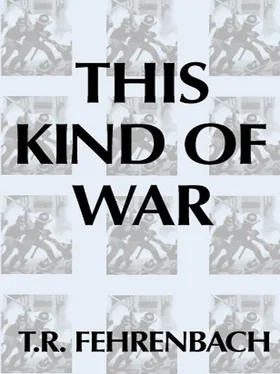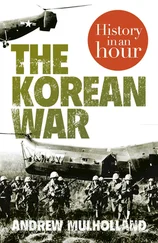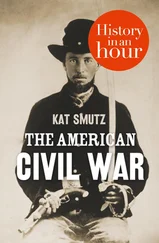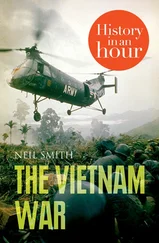And one final bitterness was that this type of warfare was self-imposed. In 1915, developments in weaponry had stalemated the battle lines; no one knew any other course. In 1953, the men along the outpost line knew that the powers that had sent them forth apparently had chosen to play the enemy's game. Fighting this anachronistic war, over the long months each of the armies changed.
The Republic of Korea Army grew better. While its high leadership was still shot through with weaknesses, its divisions had lost their horror of Chinese. Hit by waves of CCF, they no longer dissolved; they took high losses, but they held. The ROK Army was still far from "second best in the world," though it was now among the largest of the non-Communist world. Neither so good as the American or the Chinese, it still had little of which to be ashamed.
The American Army changed the least, from 1951 onward. The men came and went; the faces changed, for the United States divisions had one great disadvantage compared to the other combatants—they continually bled away their best men through rotation. Because of rotation, quality tended to remain static. The divisions retained the basic excellences developed in 1951: good weapon handling, superior communications, and superb artillery and superb artillery direction. But the troops were shot through with green men and remained somewhat clumsy and heavy-footed to the last, and their patrolling left something to be desired.
The new men arrived with legs unequal to the steep Korean slopes, and by the time they had learned to patrol the windy hills and deep valleys of no man's land, they had become casualties, or had enough points to go home.
It was the CCF, by all accounts, that changed the most. By 1953 the clumsy peasant armies, which had pushed masses of men through the valleys to the sound of horns and bugles, were no more.
There had been no rotation in the CCF, and the painful lessons of modern ground warfare had been pushed home.
In 1950, in the frightful mountains of North Korea, the CCF had won initial victories against a modern army beset by intelligence failures and deployed in an impossible scheme of maneuver, an army that had walked almost blithely into a trap. In 1951, from the Imjin to the Soyang, the CCF learned at great cost that they could not push home pell-mell attacks against a modern force that had both room to maneuver and the will to fight.
Unlike the old Imperial Japanese Army, the CCF understood the lessons of firepower, and did not repeat their failures.
After 1951, the Chinese soldier again became the phantom he had been in the North Korean hills. His fortifications and fieldworks, built with unstinted labor, almost always surpassed the American. Harassed by ever-present air power, he went completely underground, and he learned to move stealthily, and by night. He became furtive, fast, and skilled at deception.
He could pad noiselessly through the dark and assemble a battalion within U.N. lines before it was seen or heard, and fade away again before daybreak. He became adept at the ambush of American patrols, which could often be heard coming hundreds of yards away, and in the dark, deep valleys, more and more the honors went to him.
He rarely lost prisoners now, a matter of concern to American Intelligence. He proved he could slip small parties into U.N. lines and drag U.S. soldiers screaming from their bunks. While Americans continued to hate the dark, he loved the night as a friend, and made use of it.
He came onto the heavily defended U.N. hills and outposts like a phantom, and often took them within minutes. He could rarely hold them, however, under the quickly massed and superior fires of American artillery, and the grinding attacks launched against him by day, under artillery, air, and armor cover.
New American soldiers arriving in Korea were surprised to hear their officers tell them not to sell the Chinaman short, and that, man for man, the Chinese was as good a man as they. They were told of the vast improvement of the CCF; the Chinese had artillery and communications, now, supplied by Russia, and even more important, they had improved morale.
Corruption and desertion had disappeared. Rape and plunder, the old hallmarks of all Asiatic armies, were no longer reserved to field commanders or common soldiers, but to the state. Under continuous indoctrination, CCF soldiers fought more from pride and belief in their cause, and less from fear of their leaders. All ranks, down to squad privates, were briefed before operations to an extent no Western army attempted, because of security hazards.
There was no democracy in the CCF, or freedom of choice; the soldiers were still peasant conscripts, under harsh discipline. But the essential puritanism of the Communist leadership had seeped downward. As one Chinese POW proudly told Haydon Boatner on Koje-do, it was now possible to blow the whistle on a corrupt commander, and to make the charge stick.
The day of "silver bullets"—when a Chinese general could be bought—was done. Now, using machine guns, grenades, and other hand weapons with a skill they had not possessed on entering Korea, the CCF fired real bullets, with disturbing accuracy.
The erasure of the corruption that had marked Chinese life from top to bottom—and which still held sway in Korea—undoubtedly caused many individual Chinese, though they remained non-Communist, to support the new regime.
As both General Mark W. Clark and S. L. A. Marshall remarked, the two and a half years in Korea were priceless to the Chinese Army, "for on that training ground [the Chinese] armies became as skilled as any in the world in the techniques of hitting, evading, and surviving."
After the violent activity prior to the U.S. elections—about which Communists hold the same shibboleths as Westerners do about May Day—the action eased off during December 1952.
Then, by January 1953, the CCF was making life miserable again, now on Old Baldy, held by the 7th Division, now at Nori, against the Ist ROK, or at the Hook and Gibraltar, where the British stood firm.
During one small action as savage as that at Cold Harbor, the British lost a pipe major, which to the bewilderment of Americans and ROK's the British regarded as a blow against the Empire British soldiers stated, angrily, that it was easier to make a good colonel than a good pipe major, and the commander in question should have acted accordingly.
In January, shortly after Eisenhower's inauguration, the U.S. 7th Division launched one of the infrequent U.N. raids against the enemy, with the primary purpose of taking prisoners. Moving a company over frozen ground toward the bristling CCF fortifications, in open daylight, the 7th Division took a severe black eye from what it had code-named Operation Smack.
Because the move had been planned in advance, and a great amount of brass had come forward from Eighth Army and other places to observe, the press then charged that the whole operation had been staged as a show for the generals, and American boys had died for reasons somewhat similar to the early Christians in the Roman arena. While this was nonsense, it did point up three things: that the CCF had built their line to the point where any operation against it would be exceedingly costly; that any kind of losses were rapidly becoming unacceptable to the American public; and that the brass, admittedly, did not have enough to do.
On 11 February 1952, Lieutenant General Maxwell D. Taylor, who had dropped as CG of the 101st Airborne Division in Normandy, replaced Van Fleet as Eighth Army Commander. Van Fleet, disappointed at not moving up to FECOM command, retired.
Max Taylor, handsome, a paratrooper, and superb soldier, arrived understanding the situation perfectly. Among his first directives to the line was an order that every man wear his flak jacket—the new nylon or steel-plated body armor devised and issued as protection against shell fragments—at all times. Any officer, high or low, who suffered men killed was apt to find himself in painfully hot soup.
Читать дальше












